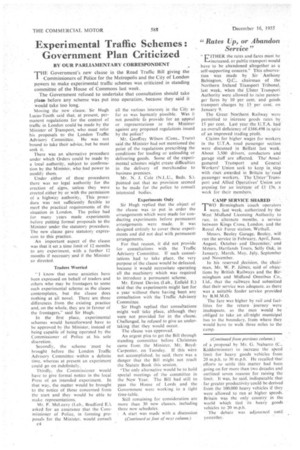"Rates Up, or Abandon Service"
Page 44

If you've noticed an error in this article please click here to report it so we can fix it.
L'ITHER the rates and fares must be
J—d increased, or public transport would have to be abandoned altogether as a self-supporting concern." This observation was made by Sir Anthony Babington, Q.C., chairman of the Northern Ireland Transport Tribunal, last week, when the Ulster Transport Authority were allowed to raise passenger fares by 10 per cent, and goods transport charges by 15 per cent. on January 9.
The Great Northern Railway were permitted to iticrease goods rates by 15 per cent. Last year the U.T.A. had an overall deficiency of £166,498 in spite of an improved trading profit.
Claims for higher wages for workers in the U.T.A. road passenger section were discussed in Belfast last week. About 3.500 drivers, conductors and garage staff are affected. The' Amalgamated Transport and General Workers' Union seek to keep in/ step with rises awarded in Britain to; road passenger workers. The Ulster"Trarkport and Allied Operatives' Union are pressing for an increase of £1 13s. a week for their members.
CAMP SERVICE SHARED
TWO Birmingham 'coach operators were, last week, authorized by the West Midland Licensing Authority to run: in alternate months, a service between Kings Cross, London, and the Royal Air Force station, Wythall.
Messrs. Beoley Garage, Beoley. will run the service in February, April. June, August, October and December, and Messrs. Hartlands Tours, Selly Oak, in January, March, May, July, September and November.
In his reserved decision, the chairman, Mr. W. P. limes. said of objections by British Railways and the Birmingham and Midland Omnibus Co., Ltd., that the railways had submitted that their service was adequate, as there was a suitable feeder service provided by B.M.M.O.
The fare was higher by rail and facilities for the return journey were inadequate, as the men would be obliged to take an all-night municipal bus to the boundary, from where they would have to walk three miles to the camp.
(Continued from previous column.)
of a proposal by Mr. G. Nabarro (C., Kidderminster) to increase the speed limit for heavy goods vehicles from 20 m.p.h. to 30 m.p.h.' He recalled that efforts to settle this matter had been going on for more than two decades and outlined seven reasons for raising the limit. It was, he said, indisputable that far greater productivity could be derived from the 100,000 heavy vehicles if they were allowed to run at higher speeds. Britain was the only country in the world which tied its heavy goods vehicles to 20 m.p.h.
The debate was adjourned until yesterday.
















































































































